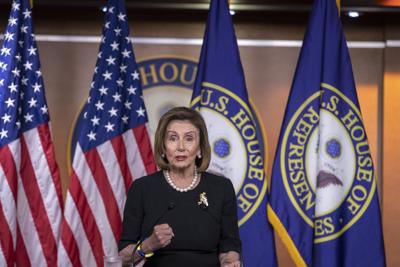Investors are already worried about a slowdown of the global economy and rising inflation, and now, Nancy Pelosi’s visit stands to stir-up new levels of anxiety.
Investors are speculating on how Nancy Pelosi’s Taiwan trip could impact global markets, from an accelerated decoupling between two of the world’s largest economies to a discussion about whether China might weaponize its vast holdings of Treasuries.
Overnight, Haven assets swung around as worries about a military response from China evaporated and Treasuries were sold off due to hawkish comments by Federal Reserve officials. After its strongest 4-day run in 2020, the Yen suffered an abrupt turn. Benchmark US yields rose 18 basis points.
Stocks were still under pressure.
Investors are already worried about the possibility of a slowdown in global growth and rising inflation, as such Pelosi’s visit to Taiwan is now becoming a new source of anxiety. Tensions between China, the US, and other countries could exacerbate an already fragile sentiment, and give a boost to safe havens like the dollar or yen while weighing on equities.
Here Are Some Comments from Strategists And Analysts:
China and Treasuries
In a note, Ian Lyngen, a strategist from BMO Capital Markets, wrote that it was only a matter of time before it became apparent that China was using its substantial Treasury holdings as retaliation for Pelosi visiting. If this is true, bearishness should not be excessive as near-term flows are outweighed by negative impacts on the global macro outlook.
Accelerated Separation
Short-term implications may include selling the rumor or purchasing the news. According to Xiadong Bao, Paris fund manager at Edmond de Rothschild Asset Management, China, the official response to market fears thus far has been more measured than expected. However, the market may overlook more important mid and long-term implications. The official US withdrawal from the Asia-Pacific will invariably accelerate US-China disassociation.
Unwinding Risk Premium
Pelosi’s Taiwan trip seemed to go without much geopolitical anxiety, Tapas Strickland (Director of Economics and Markets, National Australia Bank Ltd.) wrote in a note. Some geopolitical risks were priced prior to the event. This trend has reversed with China responding in a strong but not unhinged manner. The increase in yields likely resulted from unwinding premiums.
Inflation Pressure
According to Edward Moya, senior market analyst at Oanda, China’s response to Pelosi’s visit to Taiwan might have an effect on supply chains, demand, and price. This could increase inflationary pressures, Moya said in a note. The tensions around House Speaker Pelosi’s visit to Taiwan could also impact cryptocurrencies, which could lead to them falling in value.
Rational Minds Prevail
Pelosi’s visit against the backdrop of Ukraine is meant to have both a signaling and preventive impact. Corollary Chinese saber-rattling has been the mode of operation and should not be surprising, stated Justin Tang, Director, Head of Asian research at United First Partners. In an assessment of the Chinese economic state, rational minds are expected to prevail over the use of regulations to weaponize trade. Due to the uncertain outlook regarding inflation, rates, and earnings, the trajectory of global asset classes is likely to continue to spiral downwards.
Short-Lived Impact
Already, the state of affairs in markets is a little nervous and will likely be down in Asia today. The short-term effect will not be significant if there are no military incursions or stepped-up Chinese military drills. But, it seems unlikely that the conflict will escalate to a point of actual conflict. This would result in a larger share market fall with safe haven assets (US bonds, gold benefitting), but this appears unlikely. In the longer term, it could signal a further increase in cold-war tensions between the West (China/Russia) which will lead to higher risk premiums.
Biden Optimism
We are confident that the Biden administration won’t let things spiral out of control. Manish Bhargava (a Singapore fund manager at Straits Investment Holdings PTE) said that they are likely to enter into high-level talks to diffuse the situation. Much depends now on China’s countermeasures. While it is unlikely that China will enter into military conflict, there is a growing risk of miscalculations or accidents. A further deterioration in diplomatic relations could lead to a decrease in manufacturing and supply chain efficiency, which in turn can increase inflationary pressures.
Haven Buying
According to Jessica Amir, a strategist at Saxo Capital Markets Sydney, Fed speakers also stated that they expect more rate increases. “We believe the tone is set for equity markets for August and the remainder of the year. The risk of geopolitical tensions rising is high. Investors fear that this issue could get worse and are watching defense stocks being bought or sold. We expect the USD to increase in buying and safe havens to return.”
Sentiment to Recover
Investors may be concerned by China’s military exercises in Taiwan, according to Jian Shi Cortesi of GAM Investment Management, Zurich. There is a possibility that the military exercise will end and market sentiment will rebound.
Being one of the leading news writers of the medicalmarketreport he writes on other news sites like media.market.us, DailyHeraldBusiness, and many more., Steven holds a specialization in the domains of business and technology. The passion he has for the new developments in connected devices, cloud technology, virtual reality, and nanotechnology is seen through the latest industry coverage which is done by him. His take on the consequences of digital technologies across the world gives his writing a modern and fresh outlook.
